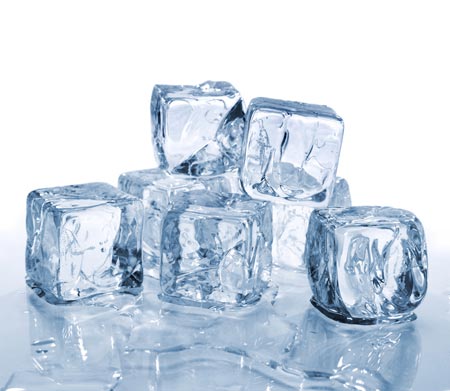Water can freeze when heated
Israeli scientists have discovered the strange ability of water to freeze when heated.

Normally, water usually hardens at 32 degrees F, equivalent to 0 degrees C. Dust and rough surfaces of water when exposed to nature are the core to crystallize around and freeze water.
However, if stored in a smooth, completely dust-free bottle, the water is still in a liquid state when lowering the temperature to a super-cold temperature of 40 degrees F (-40 degrees C).
Israeli scientists have discovered a new method of controlling the freezing temperature of water through thin films that are nearly invisible. These membranes can change the charge depending on the temperature. When the membrane is electrically positive, the water is easier to solidify when the membrane is negatively charged.
Supercooled water temperature becomes frozen when heated to a temperature that changes the charge of the membrane containing it.
For example, supercooled temperature water contained in a membrane with negatively charged lithium will freeze immediately in the direction from bottom to top when heated to 17.6 degrees F (-8 degrees C) due to electricity. The membrane layer converts to positive electricity.
Conversely, if the membrane is heated to switch from a positive charge to a negative charge, the water will solidify from top to bottom.
Israeli scientists say the ability to control the freezing temperature of water at supercooled temperatures has many important applications in maintaining low temperature cells and tissues, reviving animals that have been coagulation, protect plants from frost, as well as better understanding and proactively shaping clouds.
- Does hot water freeze faster than cold water?
- Burns skin - Things to know
- Water freeze: new irrigation
- Do not drink bottled water for long periods in the hot sun
- Ice water looks like a tree
- Overwhelmed by the phenomenon of
- Cold to minus 43.5 degrees Celsius in China, boiling water to freeze immediately
- Water freezes right under the surface of Mars
- Beautiful photos: Animals against heat
- New research helps detect life outside the Solar System
- Lasers can freeze water
- Nanotubes can 'freeze' boiling water
 'Fine laughs' - Scary and painful torture in ancient times
'Fine laughs' - Scary and painful torture in ancient times The sequence of numbers 142857 of the Egyptian pyramids is known as the strangest number in the world - Why?
The sequence of numbers 142857 of the Egyptian pyramids is known as the strangest number in the world - Why? Miracle behind the world's largest stone Buddha statue
Miracle behind the world's largest stone Buddha statue What is alum?
What is alum?